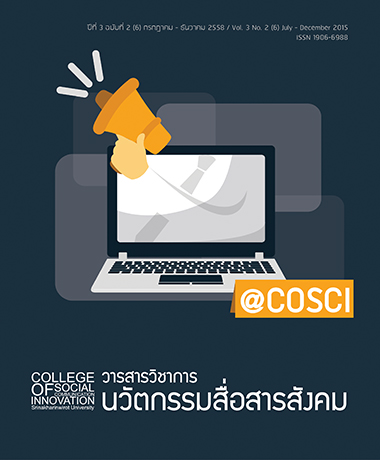การสื่อสารเพื่อการเรียนรู้และถ่ายทอดมรดกภูมิปัญญา
คำสำคัญ:
การสื่อสาร, ภูมิปัญญาท้องถิ่น, การถ่ายทอดมรดกภูมิปัญญา, การแลกเปลี่ยนเรียนรู้, Communication, Indigenous Knowledge, Passing on Intangible Cultural Heritage, Exchangingthe Knowledgeบทคัดย่อ
งานวิจัยชิ้นนี้มีเป้าหมายในการศึกษาวิถีชีวิตและมรดกทางภูมิปัญญาของชาวไทยยวนราชบุรี เพื่อวิเคราะห์และสร้างความรู้ที่เกี่ยวกับกระบวนการแลกเปลี่ยนเรียนรู้และถ่ายทอดมรดกทางภูมิปัญญาในวิถีการผลิตเพื่อยังชีพกับการผลิตเพื่อการค้า เรื่องราวแห่งรอยอดีตและมรดกทางภูมิปัญญาของชาวไทยยวนราชบุรีเป็นปรากฏการณ์ที่คนไทยกลุ่มหนึ่งที่อพยพมาจากดินแดนโยนกเชียงแสนมาตั้งรกรากในจังหวัดราชบุรีเมื่อครั้งรัชกาลที่ 1 โดยตั้งถิ่นฐานที่ริมแม่น้ำแม่กลองใกล้ตัวเมืองราชบุรี ต่อมามีการขยับขยายกระจัดกระจายอยู่ในเกือบทุกอำเภอของจังหวัดราชบุรี ชาวไทยยวนราชบุรีมีมรดกทางภูมิปัญญาของบรรพบุรุษที่โดดเด่น คือ ตัวหนังสือไทยยวน ภาษาพูดไทยยวน และการทอผ้าจก มรดกทางภูมิปัญญาในวิถีชีวิตดั้งเดิมของชาวไทยยวนเป็นองค์ความรู้ที่เชื่อมโยงกับธรรมชาติระบบความเชื่อ และระบบความสัมพันธ์ทางสังคมในวิถีแห่งการช่วยเหลือเกื้อกูลแบบพึ่งพิงอิงกัน ความรู้ที่สร้างขึ้นจึงมิได้ตั้งอยู่บนความโดดเดี่ยวแต่จะเกี่ยวโยงอย่างเป็นองค์รวม และมีการสืบทอดจากคนรุ่นหนึ่งสู่คนอีกรุ่นหนึ่ง แต่เมื่อสังคมไทยยวนเปลี่ยนผ่านจากวิถีการผลิตเพื่อยังชีพสู่การผลิตเพื่อการค้า จากเรื่องราวการทอผ้าจกที่เคยถูกใช้ในวิถีชีวิตเปลี่ยนแปลงเป็นการผลิตเพื่อขายให้กับผู้ใช้ผ้าที่อยู่ในสังคมภายนอก และวิธีการแลกเปลี่ยนเรียนรู้เพื่อสืบทอดมรดกทางภูมิปัญญามีการผสมผสานกับการศึกษาในสังคมทันสมัย มีการย่นระยะเวลาการเรียนรู้โดยใช้สื่อกราฟิกเพื่อศึกษาและฝึกทอลายผ้า การแลกเปลี่ยนเรียนรู้มีทั้งแบบของการสื่อสารแบบตัวต่อตัวในวิถีดั้งเดิม และการเรียนรู้เป็นกลุ่มในการจัดการศึกษาสมัยใหม่ วิธีการถ่ายทอดได้รับจัดประสบการณ์อย่างเป็นขั้นตอนเพื่อให้อยู่ในรูปของหลักสูตรท้องถิ่น เพื่อรับรองว่าการทอผ้าจกมีการถ่ายทอดอย่างเป็นระบบในการศึกษาของสังคมทันสมัย กระบวนการแลกเปลี่ยนเรียนรู้ของชาวไทยยวนจึงเป็นกระบวนการที่มีพลวัตร ยืดหยุ่น ตามสภาพสังคมที่เปลี่ยนแปลง
Communication for Exchanging the Knowledge and Passing on Intangible Cultural Heritage
The purpose of this research is to study theways of living and intangible cultural heritage of Thai-Youn-Rachaburi people to analyze and create knowledgerelated to the process of exchanging and passing onintangible cultural heritage in order to produce products for living as well as trading. According to the ancient chronicle, a group of Thai people migrated from Yonok,Chiang Saen to Ratchaburi province during the reignof King Rama 1. They settled on the bangs of MaeKlong River, near the city of Ratchaburi province. Later,they dispersed settlement almost in every Amphur(district) of Ratchaburi province. Thai-Youn-Rachaburi people have the remarkable intangible cultural heritagethat is Thai-Youn alphabets, Thai-Youn spoken languageand Jok weaving. Intangible cultural heritage in theways of living of Thai-Youn people in the past were related to nature, beliefs and the social relationship that was helping each other. The knowledge that was established, therefore, was not based on individualism but was related to all. Moreover, this knowledgewas also passed from one generation to the other generation. Later, Thai-Youn people have changed their ways of living from producing the products for living into producing products for trading. Jok weaving that once was used only in the family is now used to create the products that will be sold to the outsiders. Moreover, the ways of exchanging the knowledge inorder to carry on intangible cultural heritage currently integrate the modern knowledge of the society. The amount of time that is used in order to learn the pattern is decreased by the use of graphic media.Exchanging the knowledge is appeared in two ways: learning one-on-one in the traditional way and learningin groups with the modern educational system. Every step of teaching process is carefully considered in orderto guarantee that Jok weaving will be systematically taught according to the modern ways of learning in the society so that, the process of exchanging theknowledge of Thai-Youn people will be fast and flexible according to the changes of the society.
ดาวน์โหลด
รูปแบบการอ้างอิง
ฉบับ
ประเภทบทความ
สัญญาอนุญาต
บทความทุกบทความที่ได้รับการตีพิมพ์ถือเป็นลิขสิทธิ์ของวารสารวิชาการนวัตกรรมสื่อสารสังคม มหาวิทยาลัยศรีนครินทรวิโรฒ







